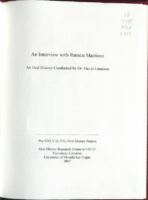Search the Special Collections and Archives Portal
Search Results

Transcript of interview with Ruby Amie-Pilot by Barbara Tabach and Claytee White, August 7, 2012
Date
Archival Collection
Description
Ruby Amie-Pilot moved to Las Vegas in 1952. She worked at the Desert Inn in the kitchen, was the first African American full time sales person at Sears; she also worked as a window dresser with Hazel Gay, and later owned travel agency with Esther Langston. In the interview, Ruby discusses moving to the Westside, Jackson street and housing developments, education, and her experiences with local leaders.
Text
Cassidy Wertheimer oral history interview
Identifier
Abstract
Oral history interview with Cassidy Wertheimer conducted by Barbara Tabach on June 18, 2020 for The Great Pause: Las Vegas Chronicles of the COVID-19 Pandemic.
Cassidy is a math teacher at Southeast Career Technical Academy; she discusses her family, personal history, and her educational philosophy from both a teacher and parent perspective with particular regard to the COVID-19 pandemic.
Subjects discussed include: Southeast Career Technical Academy; Online learning; Online teaching.
Archival Collection
Jerri Mausbach oral history interview
Identifier
Abstract
Oral history interview with Jerri Mausbach conducted by Jim Cox on October 02, 2007 for the Public School Principalship Oral History Project. In this interview, Mausbach reflects upon his experience as a teacher and administrator with Nevada’s Clark County School District (CCSD). He describes the process by which he became a teacher and eventually administrator, his experiences working with special education, and elements of his training that he believes were most useful for his career. He also discusses his approach to school administration and administrative issues that he has dealt with as the Director of Leadership Development.
Archival Collection
Joy Rineer oral history interview
Identifier
Abstract
Oral history interview with Joy Rineer conducted by Stefani Evans on December 01, 2017 for the Building Las Vegas Oral History Project. In this interview, Rineer talks about growing up in Las Vegas, Nevada. She recalls her educational experience in Las Vegas, attending the University of Utah, and studying architecture. Rineer explains how architectural education, internships, testing, and licensing processes have evolved over time, and how these processes formerly limited opportunities for women in architecture. Rineer also reflects on projects she has worked on personally, her employment with architecture firm Simpson Coulter Studio, and the firm's emphasis on community-anchored architecture. Lastly, Rineer discusses planning for schools, and changing classroom layouts to accommodate different learning styles.
Archival Collection
L. J. Bowman oral history interview
Identifier
Abstract
Oral history interview with L. J. Bowman conducted by Lidia Sedano on October 11, 2004 for the Public School Principalship Oral History Project. In this interview, Bowman discusses his upbringing and path to becoming a teacher during the 1970s. He discusses his experience as a teacher in Wisconsin and in Montana, but highlights his 17 years as principal in various Montana school districts prior to becoming a teacher in the Clark County School District in the 1990s. He discusses his personal philosophy of education, and how it influenced his career as an administrator. He also discusses highlights and challenges of his career, and provides suggestions on what makes a successful principal.
Archival Collection
Laura Gunning oral history interview
Identifier
Abstract
Oral history interview with Laura Gunning conducted by Mike Martinez on March 5, 1981 for the Ralph Roske Oral History Project on Early Las Vegas. Gunning discusses her life in Las Vegas, Nevada. Gunning first talks about her family background, her church membership, education, and the minimum wage. She also talks about the Las Vegas Strip, the first businesses and markets in Las Vegas, change in climate, and family trips.
Archival Collection

Transcript of interview with Ramon Martinez by Dr. David Emerson, April 24, 2006
Date
Archival Collection
Description
Text
Audio clip from interview with Marilyn Glovinsky and Melissa Lemoine, April 2, 2015
Date
Archival Collection
Description
Marilyn Glovinsky talks about growing up Jewish in New York "without thinking about it," and the decision to send her daughter to Hebrew School in Las Vegas.
Sound
Jose F. Lopez oral history interview
Identifier
Abstract
Oral history interview with Jose F. Lopez conducted by Elizabeth A. Hulin on September 11, 2001 for the Public School Principalship Oral History Project. In this interview, Lopez reflects upon his 31-year career as a teacher and administrator in Las Vegas, New Mexico from the 1950s to the 1990s. He discusses his educational background, and how needs for bilingual education programs influenced his decision to become a teacher. He then describes the process by which he became principal and superintendent, discusses his regular responsibilities and challenges, and offers suggestions for individuals interested in pursuing school administration.
Archival Collection
